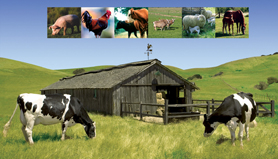Cooperative Programs
There are different types of programs that the Animal Health Branch (AHB) manages or participates in. Programs labeled Cooperative Federal/State are generally disease control or eradication programs that combine the efforts of the United States Department of Agriculture-Veterinary Services and the Food and Drug Administration (Federal), AHB (State) and producers and veterinarians (private industry) to mange specific animal diseases. Generally, USDA provides funding and often rules for the program. Listed below are links to the cooperative programs and their appropriate livestock health pages.
Other programs exist through state mandates. For example, funding might come from the state government’s general funds or through industry funds (fees charged for services). These programs exist because a problem specific to California has been identified by the various animal industries and needs to be addressed. Programs such as the Bovine Trichomonosis, Equine Medication and Monitoring, and Swine Garbage Feeding are good examples of state mandated programs. More information can be found about state programs at their appropriate livestock health page.
The third major group includes programs that are collaborative efforts between industry and local and state and federal agencies to take a voluntary approach to address issues. These are often referred to as quality assurance programs. The California Egg Quality Assurance Plan and the California Dairy Quality Assurance Program are examples of these.
Cooperative State, Federal, and Industry Programs
Bovine Brucellosis
Bovine brucellosis, caused by the bacterium Brucella Abortus, can cause significant economic losses to cattle producers from abortions, lameness, and lowered productivity. It is also transmissible to humans. California was certified free from bovine brucellosis in 1997.
Bovine Tuberculosis
Bovine tuberculosis, caused by the bacterium Mycobacterium bovis, is a debilitating disease that affects cattle, deer, and several other species including humans. On September 18, 2008, the USDA downgraded California’s bovine tuberculosis status from Accredited Free to Modified Accredited Advanced through a notice in the Federal Register.
Johne's Disease
Johne's disease, caused by the bacterium Mycobacterium avium subspecies paratuberculosis, infects the intestinal tract of ruminants, resulting in chronic diarrhea and weight loss. CDFA, along with representatives from the beef and dairy industries, academia, private practitioners, and USDA are in the process of developing a voluntary Johne's disease control program for California.
Scrapie in Sheep and Goats
Scrapie is a fatal degenerative disease affecting the central nervous system of sheep and goats. It is caused by an organism that is similar to, but distinct from, the agents of bovine spongiform encephalopathy of cattle, Creutzfeldt–Jakob disease of humans, and chronic wasting disease of deer and elk. It is not transmissible to humans.
A new National Scrapie Eradication Program was initiated by the USDA in 2001, in which California is classified as a Consistent State. Producers interested in receiving official sheep or goat ear tags or in participating in the Scrapie Flock Certification Program should call the USDA office in Sacramento at 916-854-3900 or 1-866-USDA-TAG (873-2824).
Pseudorabies
Pseudorabies is a viral disease of swine that causes high mortality in baby pigs and that can be carried by adult pigs for life. It is not transmissible to humans. California was certified free from pseudorabies in 2001.
Swine Brucellosis
Swine brucellosis, caused by the bacterium Brucella Suis, can cause abortions in pigs. Humans are also susceptible. California was certified free from swine brucellosis in 1980.
National Poultry Improvement Plan (NPIP)
The National Poultry Improvement Plan includes control programs for Salmonella pullorum, Salmonella gallinarum, Salmonella enteritidis, Mycoplasma gallisepticum, Mycoplasma synoviae, and Mycoplasma meleagridis, all of which are significant causes of poultry disease.
Resources
Contact Us
CDFA Animal Health and Food Safety Services,
Animal Health Branch
Sacramento, California 95814
Phone: 916-900-5002
Fax: 916-900-5333
Email: ahbfeedback@cdfa.ca.gov

